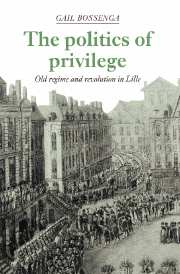Book contents
- Frontmatter
- Contents
- List of figure and tables
- Preface
- List of abbreviations
- 1 Monarchy, privilege and revolution: the problem and setting
- 2 State finance and local privileges
- 3 Corps, bureaucracy and citizenship: the case of the Bureaux des Finances
- 4 The excluded nobility and political representation
- 5 A nation of equals: the demands of the Third Estate
- 6 Uses of a regulated economy: the state against itself
- 7 Corporate privilege and the bourgeoisie
- 8 The abolition of the guilds
- 9 The corporate heritage and the well-ordered state
- 10 Conclusion
- Notes
- Bibliography
- Index
9 - The corporate heritage and the well-ordered state
Published online by Cambridge University Press: 01 October 2009
- Frontmatter
- Contents
- List of figure and tables
- Preface
- List of abbreviations
- 1 Monarchy, privilege and revolution: the problem and setting
- 2 State finance and local privileges
- 3 Corps, bureaucracy and citizenship: the case of the Bureaux des Finances
- 4 The excluded nobility and political representation
- 5 A nation of equals: the demands of the Third Estate
- 6 Uses of a regulated economy: the state against itself
- 7 Corporate privilege and the bourgeoisie
- 8 The abolition of the guilds
- 9 The corporate heritage and the well-ordered state
- 10 Conclusion
- Notes
- Bibliography
- Index
Summary
For over five hundred years, the city of Lille had held an annual procession dedicated to its divine protectress, Notre Dame de la Treille. In the procession, the city's corporate groups – the guilds with their emblems and images of patron saints, the religious confraternities with their relics, the clergy, the chapter of Saint-Pierre, the municipal magistrates, and the bailliage and gouvernance courts – wound their way through the city. Valets dressed as fools and madmen roamed among the guildmasters, snapping harmless horsehair whips to keep them in their assigned ranks. Seated on a float in the middle of the procession was a young girl dressed in white, representing the Virgin. For the townspeople, the procession was a time to eat, drink and make merry, and to drink again, much to the dismay of the clergy and delight of the local tax collectors. For many Lillois, the symbol of the procession could have been the Bacchus, who marched with the guild of tavernkeepers and carried a barrel of wine that was consumed and replenished with abandon. In 1767 the clergy insisted that the most scandalous abuses in the procession be suppressed in order to make the procession a purer, holier, and simpler ceremony, closer to its “primitive institution.” The procession's route was shortened, the valets and their foolery suppressed, and the drinking curtailed. These reforms accomplished, the tax collectors began to complain. To keep up receipts from the sale of beer and liquor during the festivities, the municipal magistrates began to sponsor games for the people after the procession.
- Type
- Chapter
- Information
- The Politics of PrivilegeOld Regime and Revolution in Lille, pp. 177 - 200Publisher: Cambridge University PressPrint publication year: 1991



